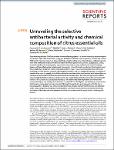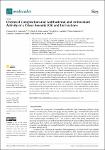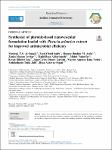Microencapsulation Enhances the in vitro Antibacterial Activity of a Citrus Essential Oil

Fecha
2020-12-07Autor(es)
Ambrosio, Carmen M.S.
Alvim, Izabela D.
Contreras Castillo, Carmen J.
Da Gloria, Eduardo M.
Metadatos
Mostrar el registro completo del ítemResumen
ABSTRACT
Essential oils (EOs) have become a promising alternative to antibiotic use in animal breeding because of their biological properties. Citrus EOs, a by-product of citrus processing industries, could be a feasible alternative due to their vast production worldwide. Encapsulation techniques, such as microencapsulation, could enable EO application in animal feed, preserving EO bioactivity. This study analyzes the use of foodgrade polymers, chitosan and modified starch, for microencapsulation of a commercial citrus EO, Brazilian orange terpenes (BOT), by spray-drying. Physical properties characterization showed that the microencapsulated BOT (MB-OT) had a moisture content = 5.39 %, aw = 0.40 and bulk density = 0.42 g/mL. Overall, microparticles presented a slight irregular-spherical shape, with a mean diameter of 2.77 μm and high polydispersity. Encapsulation efficiency reached 61.17 %. Furthermore, the antibacterial activity results showed that MBOT exerted a higher activity on enterotoxigenic E. coli U21 (isolated from pig gut) than on Lactobacillus rhamnosus, thus presenting a selective antibacterial activity between the pathogenic and beneficial bacteria. Moreover, MBOT exerted a higher selective antibacterial performance than the raw BOT, meaning the antibacterial performance of the raw BOT was enhanced by encapsulation. This is probably because wall material besides protects the raw BOT against volatilization; it could have interacted in synergism with the raw BOT enhancing the antibacterial effect of the MBOT powder. Finally, limonene was detected as the major compound in BOT by polar/non-polar GC-MS. Therefore, the modified starch-chitosan matrix could result in advantageous to encapsulate BOT and turn feasible its application in animal feed.
Mostrar más
Cita bibliográfica
Ambrosio, C. ...[et al]. (2019). Microencapsulation Enhances the in vitro Antibacterial Activity of a Citrus Essential Oil. Journal of Essential Oil Bearing Plants, 23(5), 985-997. https://doi.org/10.1080/0972060X.2020.1833763
Colecciones
El ítem tiene asociados los siguientes ficheros de licencia:
Excepto si se señala otra cosa, la licencia del ítem se describe como info:eu-repo/semantics/openAccess
Ítems relacionados
Mostrando ítems relacionados por Título, autor o materia.
-
Unraveling the selective antibacterial activity and chemical composition of citrus essential oils
Ambrosio, Carmen M.S.; Ikeda, Natália Y.; Miano, Alberto C.; Saldaña, Erick; Moreno, Andrea M.; Stashenko, Elena; Contreras-Castillo, Carmen J.; Da Gloria, Eduardo M. (Springer Nature, 2019-11-27)Acceso abiertoABSTRACT Post-weaning diarrhea (PWD) is an often disease affecting piglets. It is caused mainly by enterotoxigenic Escherichia coli (ETEC) colonization in pig gut. Antibiotics has been used to prevent, combat and control ... -
Chemical composition and antibacterial and antioxidant activity of a citrus essential oil and its fractions
Ambrosio, Carmen M.S.; Diaz-Arenas, Gloria L.; Agudelo, Leidy P.A.; Stashenko, Elena; Contreras Castillo, Carmen J.; Da Gloria, Eduardo M. (Marcello Iriti and Md. Moshfekus Saleh-E-In, 2021-05-13)Acceso abiertoABSTRACT Essential oils (EOs) from Citrus are the main by-product of Citrus-processing industries. In addition to food/beverage and cosmetic applications, citrus EOs could also potentially be used as an alternative to ... -
Synthesize of pluronic-based nanovesicular formulation loaded with Pistacia atlantica extract for improved antimicrobial efficiency
Al Ouqaili, Mushtak T. S.; Saleh, Raed Obaid; Amin, Hawraz Ibrahim M.; Jawhar, Zanko Hassan; Akbarizadeh, Majid Reza; Naderifar, Mahin; Issa, Kovan Dilawer; Gavilán, Juan Carlos Orosco; Nobre, Marcos Augusto Lima; Jalil, Abduladheem Turki; Akhavan Sigari, Reza (King Saud University, 2023-03-07)Acceso abiertoOne of the current concerns to human health is antibiotic resistance, which promotes the use of antibiotics that are more harmful, expensive, and ineffective. In this condition, researchers are turning to innovative options ...





